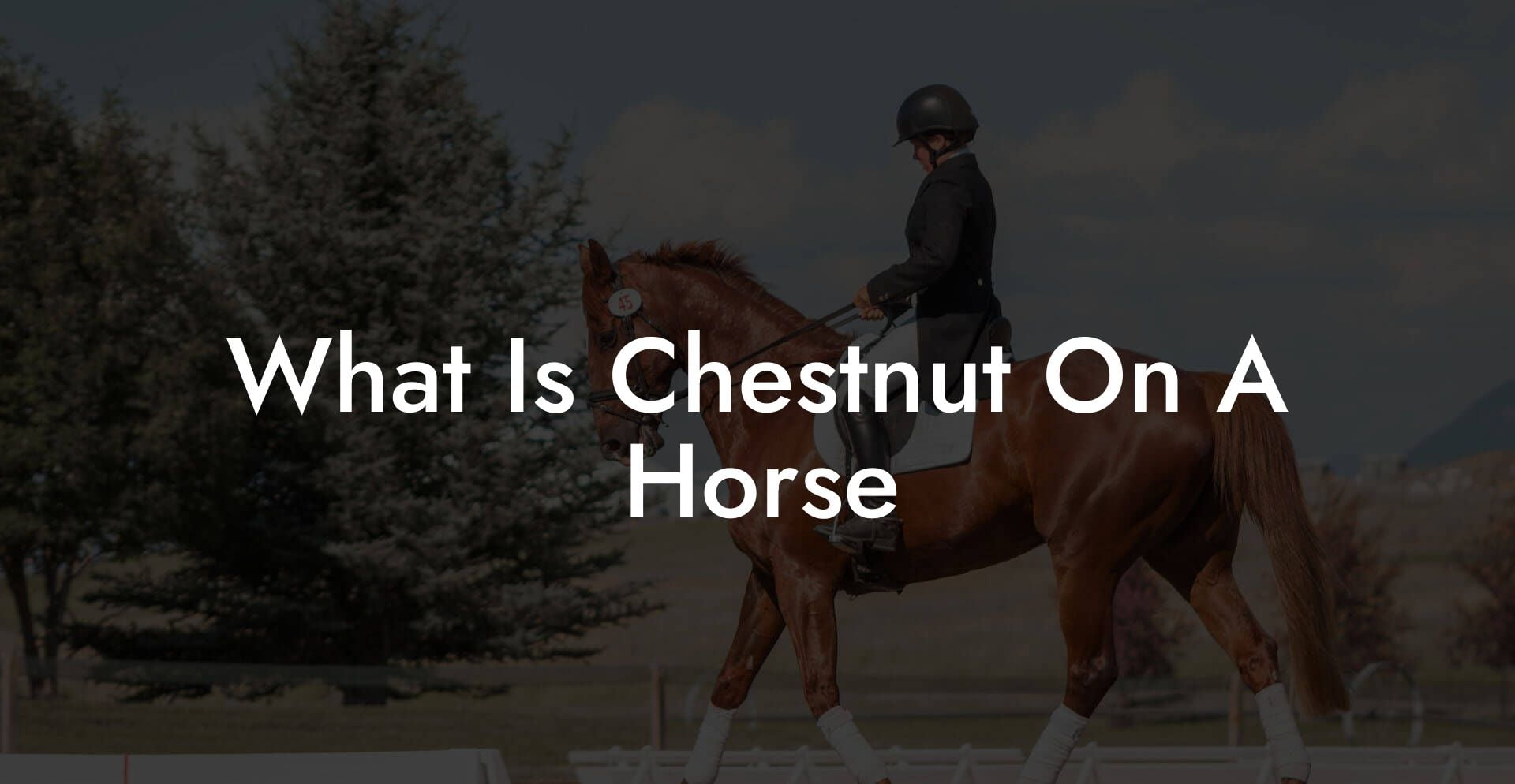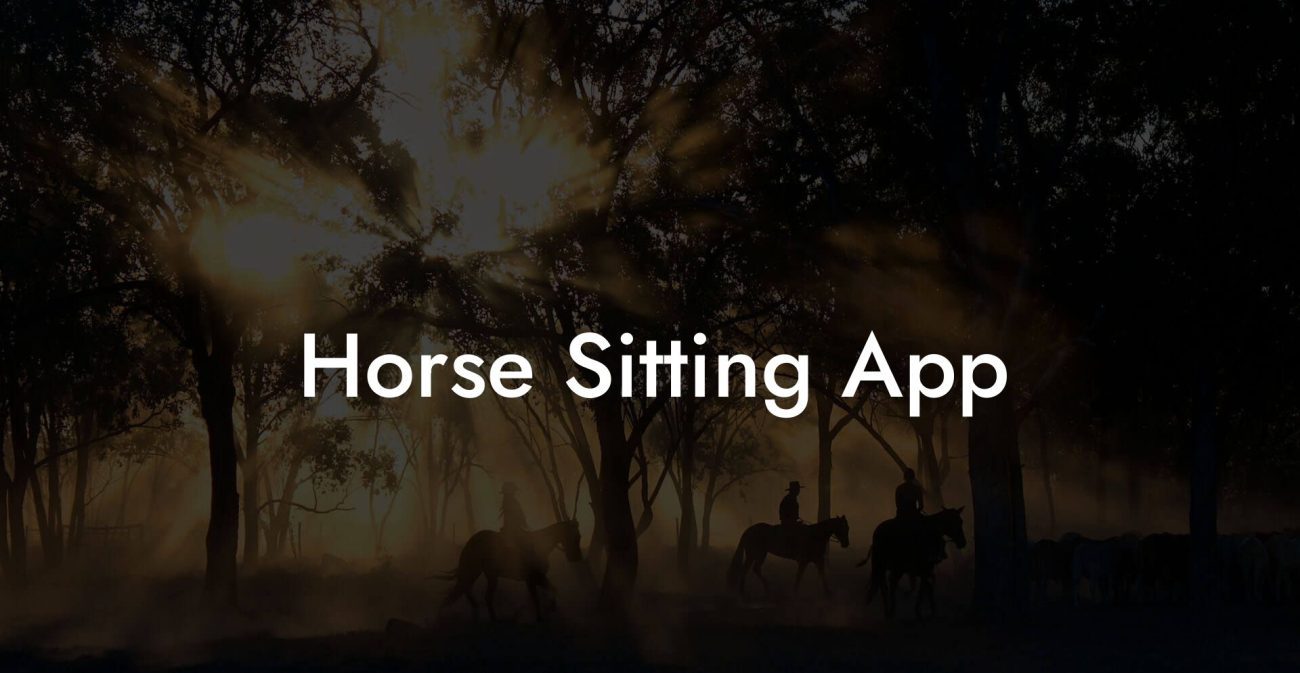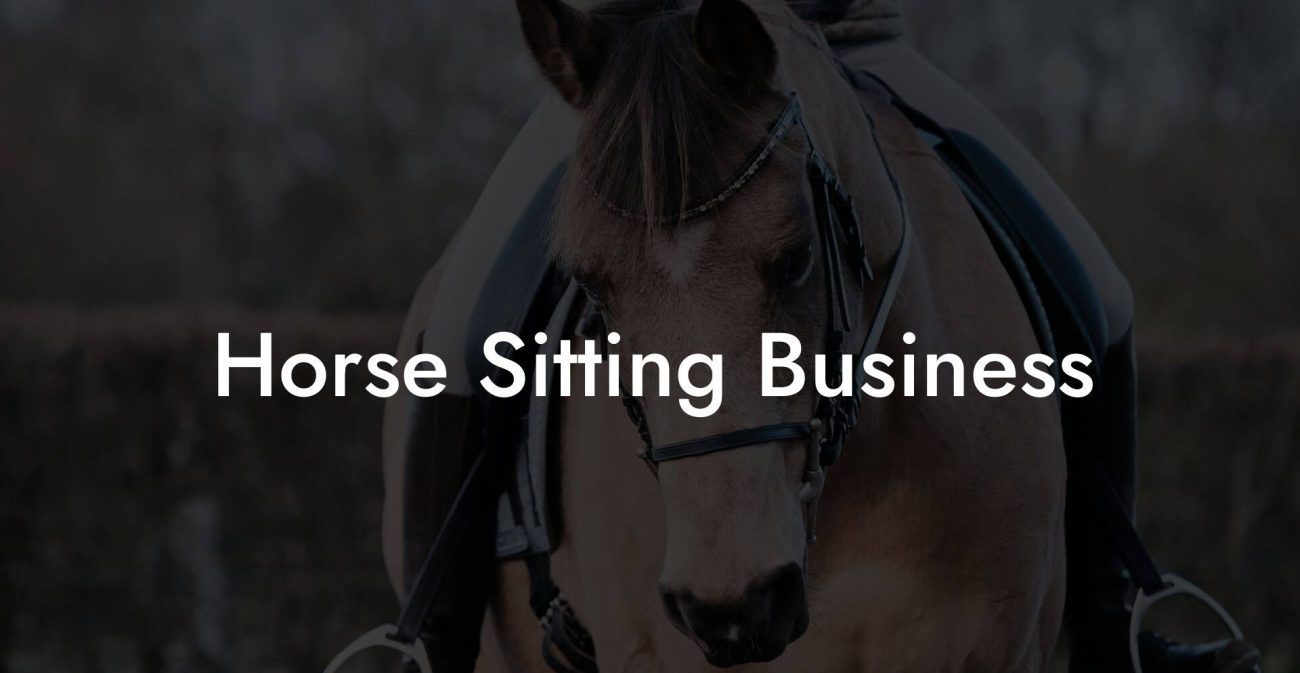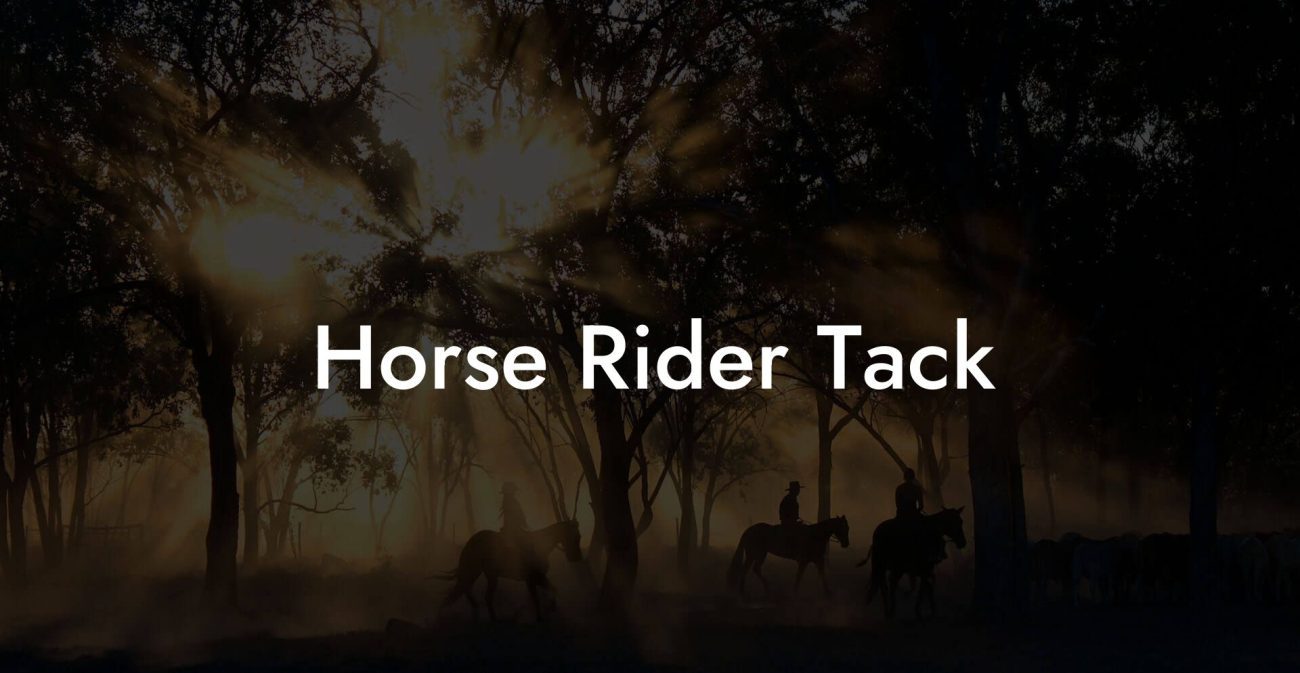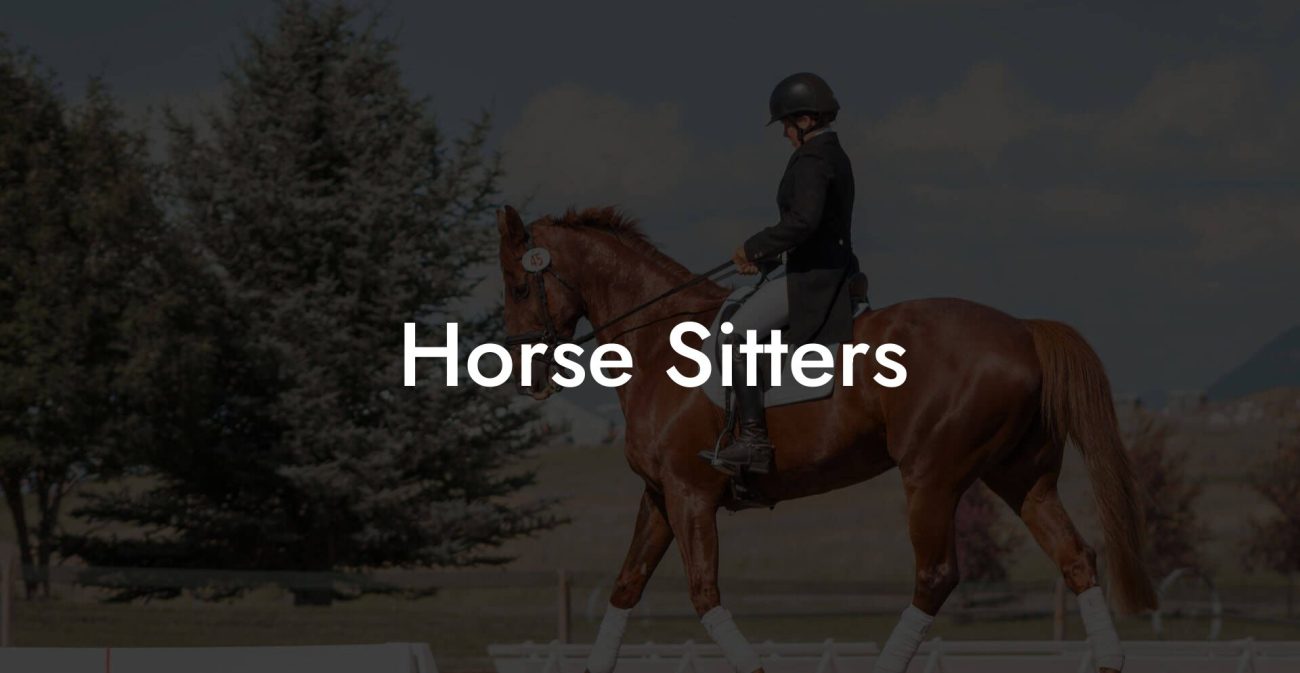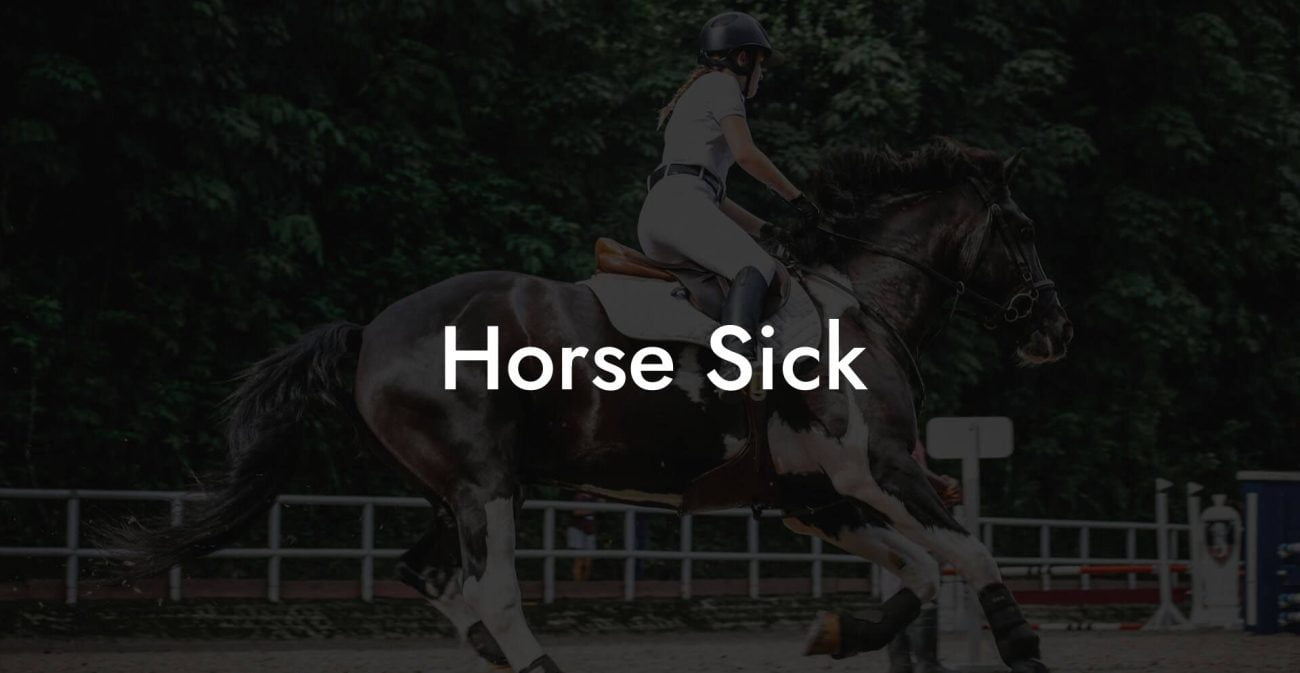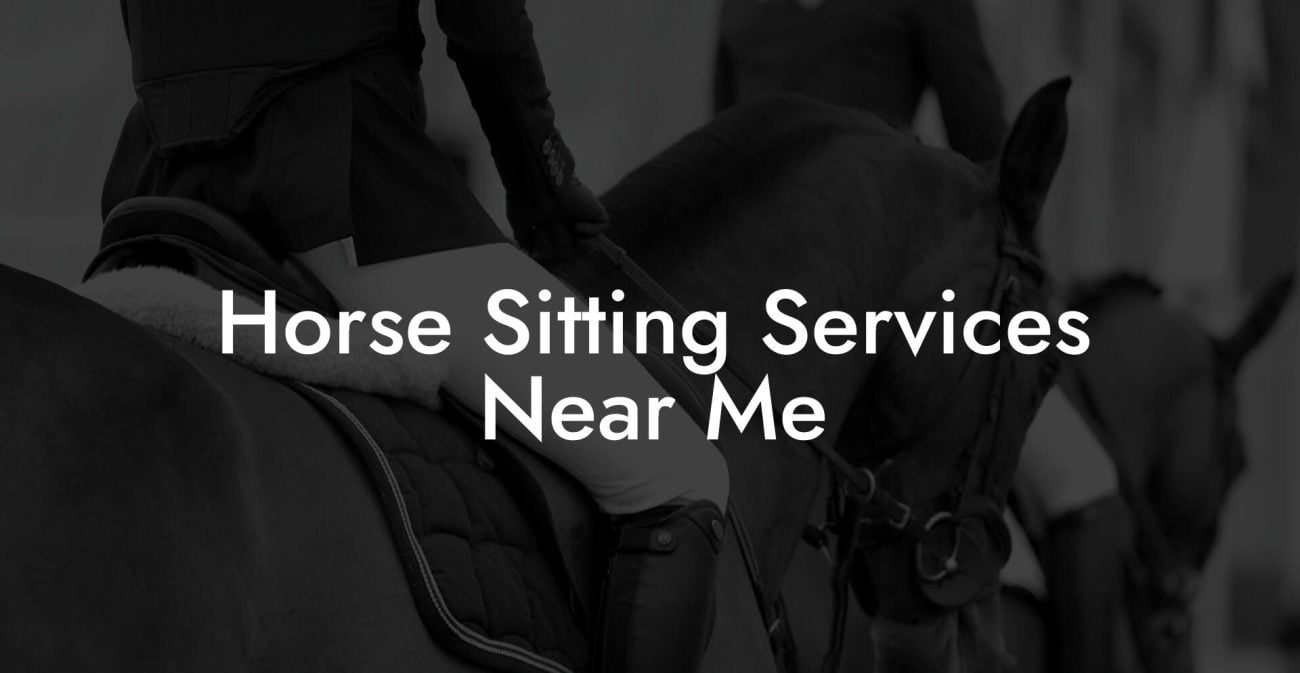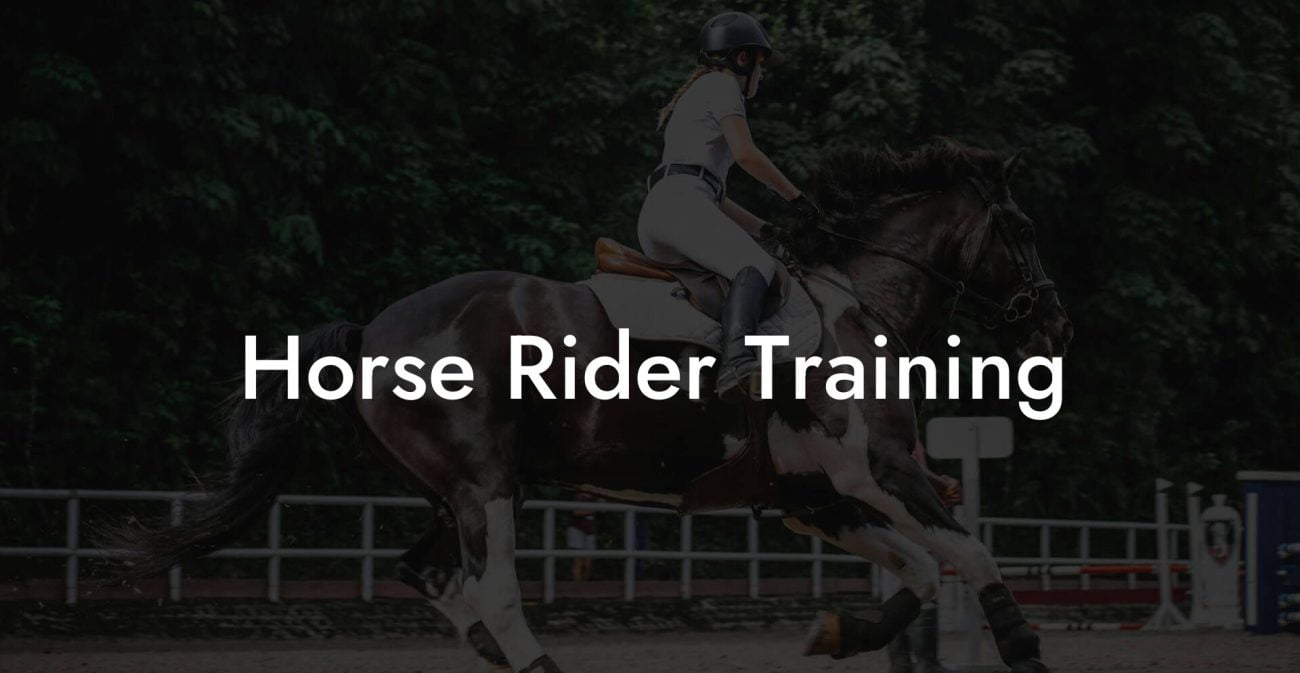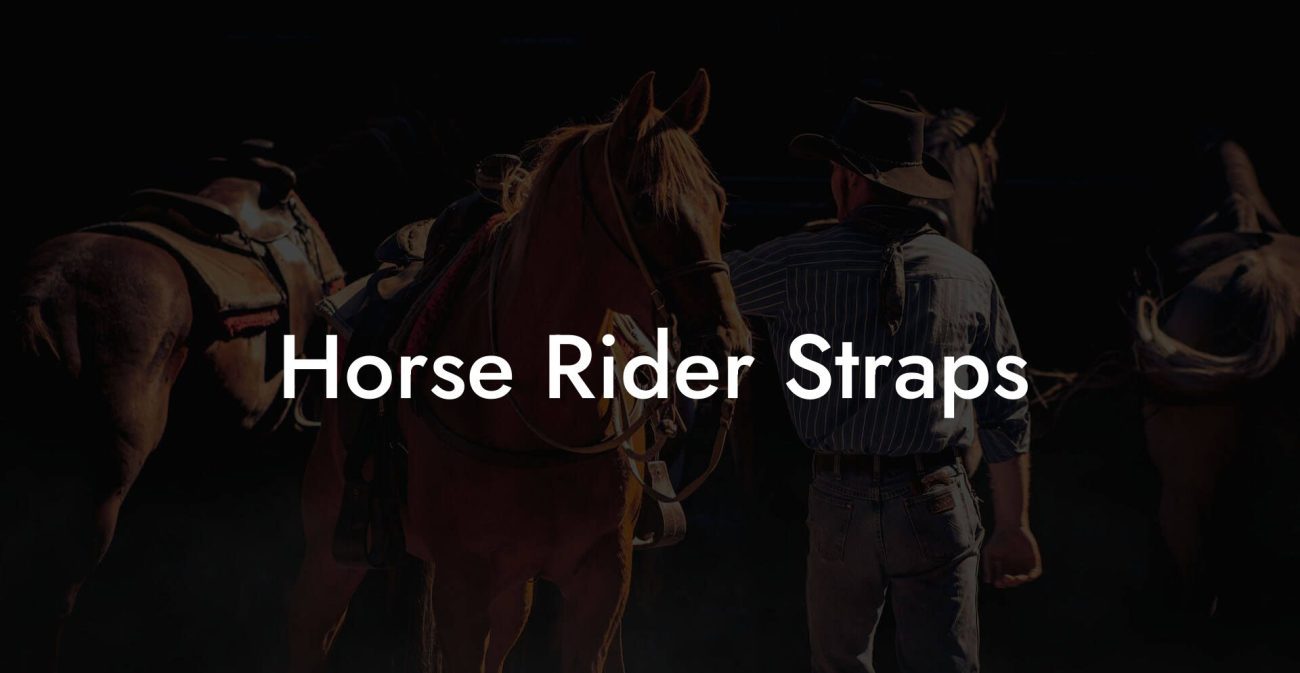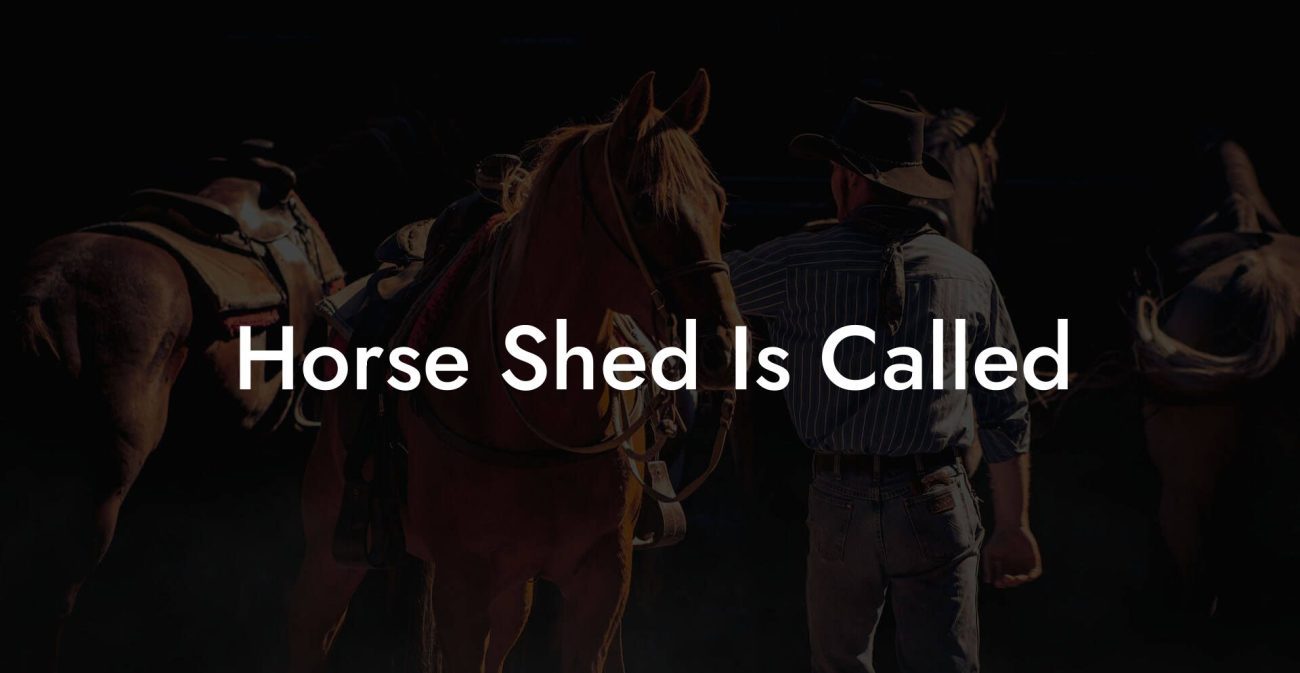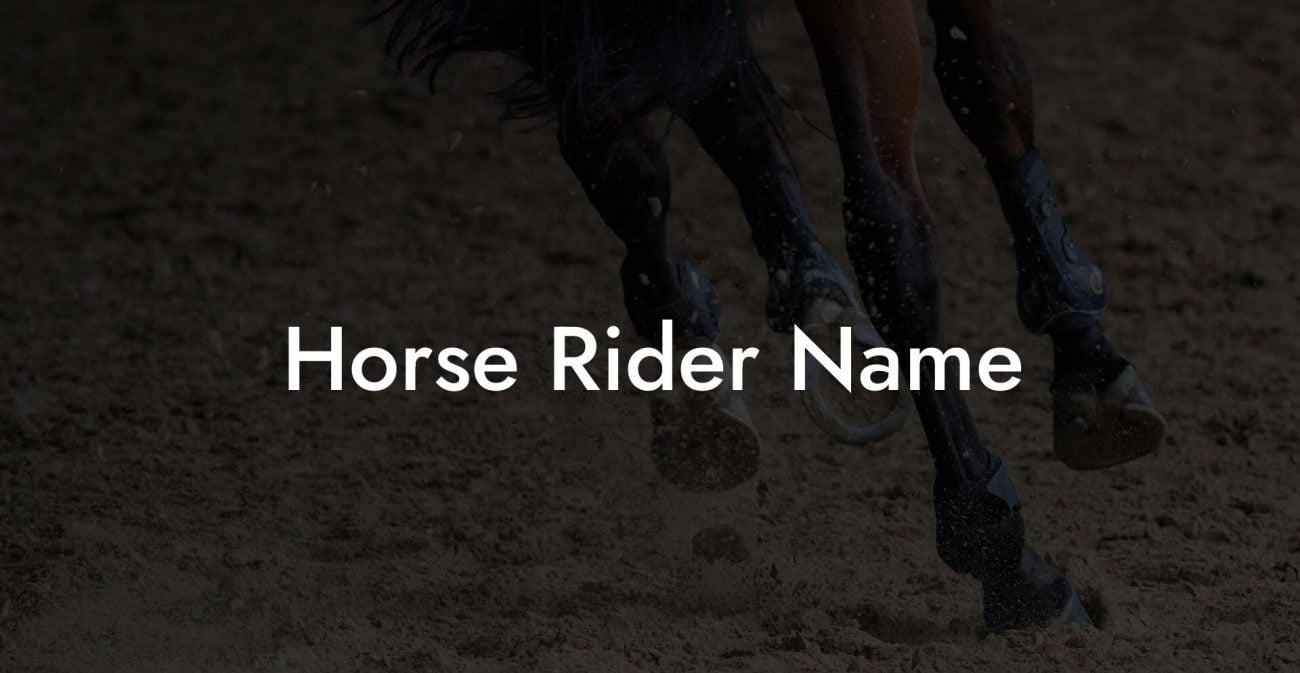Ever wondered what it really means when someone refers to a horse as "chestnut?" Beyond being just a catchy color name, chestnut horses boast a rich history, a fascinating genetic story, and unique care needs that make them a standout in the equine world. In this in-depth guide, we’re diving headfirst into the world of chestnut horses, from the science behind that gorgeous reddish coat to real-life tips on grooming, feeding, and celebrating every facet of their intriguing personality. Whether you’re a long-time horse enthusiast or a Gen-Z or millennial newcomer looking to care for your equine buddy, this guide has you covered in an engaging, down-to-earth style with a dash of humor.
Quick Links to Useful Sections
- Understanding the Chestnut Coat: More Than Just a Shade of Red
- Genetics 101: What Gives a Horse Its Chestnut Coat?
- Key Characteristics of the Chestnut Coat
- A Closer Look at Horse Coat Colors: Where Does Chestnut Fit In?
- Comparing Chestnut to Bay, Black, and Grey
- Traits and Temperament: More Than Just a Beautiful Coat
- The Distinctive Personality of Chestnut Horses
- Myths Versus Reality: Debunking Some Chestnut Misconceptions
- Caring for Your Chestnut Beauty: Grooming, Feeding, and health Essentials
- Grooming That Makes Your Chestnut Shine
- Diet and nutrition: Fueling the Fiery Spirit
- Exercise and Health: Keeping the Spark Alive
- The Role of Genetics in Chestnut Horses: A Closer Look
- Decoding the Chestnut Gene
- Variations Within the Chestnut Spectrum
- Common Myths and Misconceptions About Chestnut Horses
- Myth #1: Chestnut Horses Are More Temperamental
- Myth #2: Chestnut Coats Fade or Require Extra Maintenance
- Myth #3: Only Certain Breeds Can Be Chestnut
- Cultural and Historical Significance: Chestnut Horses Through the Ages
- A Legacy in Art and Literature
- Notable Chestnut Horses in History
- Finding the Perfect Chestnut Companion
- Evaluating Temperament and Compatibility
- Researching Reputable Breeders and Rescues
- Ensuring a Smooth Transition to Your Home Stable
- Resources and Community Support: Your Next Steps
- Real-Life Transformations: Stories from the Chestnut Community
- Story 1: From Struggles to Stardom
- Story 2: The Healing Power of Community
- Story 3: Turning a Hobby into a Lifelong Passion
- Building a Lasting Bond: Tips for Daily Interaction and Exercise
- Interactive Grooming and Bonding Sessions
- Incorporate Fun, Low-Stress Exercise
- Mindful Moments and Consistency
- Frequently Asked Questions About Chestnut Horses
- Your Journey with Chestnut Horses: Embrace the Flame
Understanding the Chestnut Coat: More Than Just a Shade of Red
When you think of chestnut, you might picture a warm, reddish-brown hue that glows in the sunlight. But think again, there’s more to a chestnut horse than meets the eye. In the equine world, the term “chestnut” refers predominantly to a color pattern that spans a spectrum from deep, dark auburn to a bright, almost fiery copper. Unlike some other coat colors that may require complex genetic codes to explain, chestnut horses are celebrated for their simple yet stunning beauty.
Genetics 101: What Gives a Horse Its Chestnut Coat?
Behind every chestnut coat lies a particular genetic makeup. The chestnut color in horses is determined by a specific recessive gene, known as the “e” allele. In simpler terms, for a horse to express the chestnut phenotype, it must carry two copies of the recessive chestnut gene. This means that even if a horse carries one chestnut gene, if the other gene is dominant (like the gene for black or bay), the horse will not show the classic chestnut color.
This genetic mechanism results in a fascinating array of shades within the chestnut family. No two chestnut horses are exactly alike, instead, you’ll find variations ranging from light sorrel to deep liver chestnut. This diversity not only makes each horse unique but also provides breeders with endless opportunities for creativity in equine color palettes.
Key Characteristics of the Chestnut Coat
Aside from the obvious beauty of their color, chestnut horses are known for a few standout physical traits:
- Uniform Coat: Unlike some other coat patterns, chestnut horses often have a relatively uniform coat color all over their body, though some may display lighter or darker shades on their mane and tail.
- Eye and Skin Contrast: These horses typically have eyes that provide a striking contrast to their coat colors, from warm brown to a gleaming amber, which can add extra allure.
- Glow in the Sun: The chestnut hue seems to come alive under the sun’s rays, giving it almost a reddish-gold glow that many find irresistible.
All in all, the chestnut coat is about more than mere aesthetics. It’s a blend of art and science, a genetic masterpiece that has captured the attention of horse lovers and breeders alike for centuries.
A Closer Look at Horse Coat Colors: Where Does Chestnut Fit In?
In the grand spectrum of equine coat colors, chestnut holds a special place. While breeds like the majestic Arabian often sport a variety of colors and patterns, the chestnut is one of the most common and beloved among many horse breeds. However, what sets chestnut horses apart is not just the color, it’s also the way this color interacts with the horse’s overall physicality and personality.
Comparing Chestnut to Bay, Black, and Grey
To understand chestnut better, it helps to compare it to other common coat colors:
- Bay: Bay horses are typically characterized by a reddish-brown body with a black mane, tail, and lower legs. In contrast, chestnut horses lack the black points, there’s a harmonious blend of red hues all over.
- Black: Black horses have a solid, deep coat with little variation. Chestnuts, however, display a range of reds and browns that can even shift slightly with seasons and light.
- Grey: Grey horses often start with a darker coat that lightens over time, eventually turning almost white. Chestnuts maintain their warm tone from birth, although regular grooming and the environment can influence the vibrancy of their coat.
The unique qualities of a chestnut horse, such as their unpredictable range of hues and the way they seem to shimmer in natural light, make them a favorite among horse fans. It’s like comparing a classic vintage car to a modern electric model, both are remarkable, but each holds its own charm and character.
Traits and Temperament: More Than Just a Beautiful Coat
While the striking appearance of a chestnut horse might first catch your eye, their personality and temperament often leave a lasting impression. In the world of equine care, understanding your horse’s temperament is just as important as caring for its coat.
The Distinctive Personality of Chestnut Horses
Anecdotal evidence and years of equine observation suggest that chestnut horses often carry a spark of spirited independence. Many owners describe them as playful, bright, and full of energy, a combination that makes them an absolute joy to be around. Of course, as with any breed or color, personality can vary widely from one horse to the next, but there is a common thread of warmth and friendliness among many chestnuts.
Here are some of the personality traits that many chestnut horse enthusiasts rave about:
- Energetic and Spirited: Chestnut horses often have an infectious energy that makes them fun to work with, whether on a trail ride or during training sessions.
- Friendly Demeanor: Their approachable nature means they generally get along well with other horses and people alike.
- Resilience: With a natural determination that shines through in challenging situations, chestnuts are known for bouncing back after setbacks, both physically and mentally.
Understanding these traits not only improves your bond but also helps tailor your care approach to match their unique energy levels and exercise needs.
Myths Versus Reality: Debunking Some Chestnut Misconceptions
Like many things in the animal world, a few myths have grown up around chestnut horses. One popular misconception is that chestnut horses are somehow more temperamental or less trainable than their bay or black counterparts. Quite the opposite, many owners report that chestnuts are very eager to learn and thrive on positive reinforcement. Another myth suggests that chestnut horses are exclusively suited for specific disciplines like trail riding only, when in fact, their versatility means they excel in show jumping, dressage, and even high-energy western riding.
In the end, while a horse’s coat color is a distinctive visual trait, the real magic lies in the heart and soul of the animal itself.
Caring for Your Chestnut Beauty: Grooming, Feeding, and health Essentials
Owning a chestnut horse is like having your very own fiery work of art, the stunning coat is both a blessing and a responsibility. Proper care ensures that your chestnut not only looks fabulous but also remains healthy and spirited for years to come. In this section, we’ll cover everything from grooming routines to dietary tips that are perfect for modern equine lovers.
Grooming That Makes Your Chestnut Shine
Regular grooming is a must if you want your chestnut coat to dazzle. Not only does grooming enhance the natural luster of the coat, but it also helps in detecting early signs of skin issues or parasites.
- Daily Brushing: A good brush removes dirt, sweat, and loose hair, but don’t be afraid to mix it up with a curry comb to stimulate the skin and spread natural oils evenly.
- Bathing: While over-bathing can strip natural oils, your chestnut horse may benefit from a gentle wash every few weeks. Use a mild equine shampoo designed for sensitive skin.
- Manicure for the Mane and Tail: Keeping the mane and tail tangle-free not only boosts your horse’s appearance but also prevents potential skin irritations. Consider using a detangling spray or conditioner formulated for horses.
- Seasonal Touch-Ups: As seasons change, your horse’s skin can react differently. In the winter months, when the air is dry, supplementing grooming with moisturizing sprays can help maintain a healthy coat.
Regular grooming sessions are more than just a beauty treatment, they’re also an excellent bonding time. Take a cue from your favorite influencers and make grooming a fun, intentional ritual that you both look forward to.
Diet and nutrition: Fueling the Fiery Spirit
Feeding your chestnut isn’t just about filling the hay bale; it’s about ensuring that your horse’s body gets the right balance of nutrients needed for a lustrous coat and robust health. Here’s how to nail that equine diet:
- High-Quality Forage: Grass or hay should form the basis of the diet. The natural fibers not only aid digestion but also contribute to a healthier coat and skin.
- Lean Proteins and Minerals: Protein is essential for muscle maintenance and coat repair. Look for supplements or balanced feeds that offer the right mix of amino acids, vitamins, and minerals.
- Essential Fats: Omega-3 and Omega-6 fatty acids are known to enhance skin health and coat shine. Incorporate supplements like flaxseed or fish oil as recommended by your vet.
- Fresh Water: It may seem obvious, but constant access to fresh water is crucial. Hydrated skin is happy skin, which means a coat that truly sparkles.
Consider consulting an equine nutritionist for a tailored meal plan, because just as influencers swear by clean eating, your chestnut will thrive on a diet crafted specifically to bolster its natural beauty.
Exercise and Health: Keeping the Spark Alive
A well-cared-for chestnut isn’t just a pretty face, it’s a well-oiled machine built for performance. Regular exercise keeps your horse’s muscles toned and its metabolism in check. Whether it’s trail riding through scenic pastures, participating in dressage, or just a few laps around the arena, a consistent routine is key.
Along with exercise, regular veterinary check-ups are fundamental. Keep an eye on common equine issues like skin conditions, hooves care, and overall stamina. By staying proactive about your horse’s health, you not only extend their living quality but also ensure that their striking chestnut coat remains in top shape.
And remember, a little extra love goes a long way. Spend quality time with your horse, get to know their quirks, and tailor their care routine to match their individual needs. A healthy, happy chestnut horse is a true masterpiece in motion.
The Role of Genetics in Chestnut Horses: A Closer Look
While we’ve touched on genetics in our introduction, it’s worth diving deeper into the intricacies behind why chestnut horses are so uniquely beautiful. If you’ve ever been curious about the mysterious forces that shape your horse’s appearance, the story of the chestnut gene is truly a tale worth telling.
Decoding the Chestnut Gene
At its core, the chestnut phenotype is the result of a recessive gene. For a foal to be chestnut, both parents must contribute the recessive allele. This genetic rule opens up an intriguing world of probabilities and surprises, especially if you’re mixing breeds or working with horses of varying coat colors.
Genetic testing is becoming more popular among horse enthusiasts, and it can be a powerful tool for predicting coat colors in foals. With modern techniques, breeders can determine whether a pairing might produce a chestnut filly or colt. This science-backed approach helps preserve lineage purity and ensures that the unique hues of chestnut remain vibrant in future generations.
Variations Within the Chestnut Spectrum
Even within the confines of the chestnut gene, nature loves to flex its creative muscles. The resulting coat can vary significantly depending on other genetic influences, age, and even environmental factors. You might find a horse whose coat deepens in color during the summer months, only to soften with the arrival of cooler weather. These seasonal shifts add yet another layer of dynamism to the overall character of chestnut horses.
It’s this unpredictable charm that endears chestnut horses to so many owners, the assurance that every day with your horse might reveal a slightly different, yet equally mesmerizing, variation of a timeless color.
Common Myths and Misconceptions About Chestnut Horses
As with any popular topic, chestnut horses have accrued their fair share of myths and misconceptions over the years. Let’s debunk some of these to dispel any lingering doubts:
Myth #1: Chestnut Horses Are More Temperamental
One of the most common myths is that chestnut horses have a fiery temperament, often due to the perceived “fiery” appearance of their coat. However, temperament is influenced far more by breeding, training, and individual personality than by coat color. Many chestnut horses are gentle, easygoing, and surprisingly patient, perfect for both riding novices and seasoned competitors.
Myth #2: Chestnut Coats Fade or Require Extra Maintenance
Some critics argue that the chestnut coat is more prone to fading in the sun or looking lackluster without constant upkeep. While it’s true that proper grooming is essential for any horse, a healthy chestnut coat should remain radiant with routine care. With the right nutrition, grooming techniques, and seasonally adjusted care, your chestnut will maintain its natural vibrancy.
Myth #3: Only Certain Breeds Can Be Chestnut
Although some breeds are more commonly associated with chestnut hues, the chestnut gene is widespread. From the grandeur of the Thoroughbred to the spirited Quarter Horse, chestnut can be found across many breeds. This widespread occurrence simply underscores the popularity and timeless appeal of the chestnut look.
By understanding the facts behind these myths, you can better appreciate the natural beauty and character of chestnut horses, without getting lost in misconceptions.
Cultural and Historical Significance: Chestnut Horses Through the Ages
The allure of chestnut horses stretches far beyond their physical beauty, their history weaves through art, literature, and the annals of equine sports. From the regal steeds depicted in classic paintings to the celebrated racehorses on modern tracks, chestnut horses have long captured the human imagination.
A Legacy in Art and Literature
Throughout history, chestnut horses have been immortalized in works of art. Many famous painters chose the deep, rich hues of chestnut horses to symbolize passion, strength, and an enduring spirit. Similarly, writers and poets have used the image of the chestnut horse as a metaphor for both beauty and resilience, a living embodiment of nature’s artistry.
This historical reverence has influenced contemporary equine culture as well, elevating the chestnut horse from a simple color variant to a symbol of timeless elegance and strength.
Notable Chestnut Horses in History
There are numerous celebrated chestnut horses that have left their mark in various equestrian disciplines. Whether as champion racehorses or as beloved companions in cinematic classics, these horses have built a legacy that continues to inspire modern riders and breeders.
Their stories remind us that behind every great chestnut is a narrative of triumph, determination, and often, a touch of wild spirit, a narrative that resonates deeply with today’s holistic approach to both animal care and personal well-being.
Finding the Perfect Chestnut Companion
So, you’re smitten by the charm of chestnut horses and are considering adding one to your life. How do you choose the perfect companion and ensure that your new friend gets the best start possible? Whether you’re scouting at a local stable or exploring reputable breeders online, here are some key considerations:
Evaluating Temperament and Compatibility
While the coat color might have caught your eye, it’s essential to evaluate a horse’s temperament and overall health. Spend time interacting with the horse, notice its energy levels, its response to handling, and its overall demeanor. Ask questions about training history, any previous health issues, and dietary preferences. A thorough background check can help ensure that your chestnut companion is a perfect match for your lifestyle.
Researching Reputable Breeders and Rescues
Whether you’re buying from an established breeder or adopting from a rescue, doing your homework is critical. Look for testimonials, reviews, and recommendations from other horse enthusiasts. Don’t be afraid to ask for references and visit the facilities in person. A reputable breeder or rescue center will be transparent about the horse’s health records, lineage, and daily care routines, ensuring that you’re getting a well-nurtured animal.
Ensuring a Smooth Transition to Your Home Stable
Once you’ve found your perfect chestnut companion, planning for a smooth transition is key. Prepare your stable with all the necessary equipment, from proper bedding and grooming supplies to safe pastures and adequate exercise areas. Support from a seasoned trainer or veterinarian can help ease any initial challenges and set the stage for a long, healthy partnership.
Remember, the journey of owning a chestnut horse is as much about building a relationship as it is about aesthetics. By investing time and care into your horse’s transition, you lay the groundwork for many years of mutual trust and adventure.
Resources and Community Support: Your Next Steps
Ready to dive deeper into the world of chestnut horses? The equine community is filled with resources, from online forums and social media groups to local clubs and veterinary networks. Here are some ideas to get you started on your journey:
- Join Equine Forums: Engage with fellow horse enthusiasts on platforms like The Horse Forum, Chronicle of the Horse, and even dedicated Reddit communities. These hubs are treasure troves of advice, personal experiences, and detailed discussions about everything chestnut.
- Follow Social Media Influencers: Instagram and TikTok are filled with modern equine influencers who share daily updates, behind-the-scenes care tips, and inspirational stories about their chestnut companions. Following these accounts can keep you motivated and informed.
- Attend Local Horse Events: Whether it’s a local equestrian show, a clinic, or a community meetup, face-to-face events are a great way to learn about care, training, and the latest trends in horse wellness.
- Consult with Experts: Don’t hesitate to reach out to veterinarians, nutritionists, and certified trainers. Many experts offer webinars, online Q&A sessions, and even one-on-one consultations tailored to your needs.
- Explore Online Courses and Workshops: Continuous learning is key in any passion. Look for online classes on equine care, genetics, and holistic management practices to enhance your understanding and skills.
By tapping into these resources, you’re not only gaining knowledge but also joining a vibrant community that shares your love for these beautiful animals. The more connected you become, the better equipped you’ll be to provide your chestnut companion with the very best in care and understanding.
Real-Life Transformations: Stories from the Chestnut Community
A picture might be worth a thousand words, but real-life stories from fellow chestnut horse owners give us insight into the extraordinary bond between a horse and its human. Here are a few inspiring tales that highlight the transformative power of proper care and unwavering passion:
Story 1: From Struggles to Stardom
Meet Sierra, a chestnut mare whose early years were marred by neglect and mismanagement. Once a timid, underfed animal, Sierra’s life took a dramatic turn when a dedicated owner discovered her potential. With a carefully tailored nutrition plan, consistent grooming routines, and a lot of patience, Sierra transformed into a spirited and confident horse. Today, she’s not only a favorite at local shows but has also become a mascot for a rescue initiative dedicated to giving horses, a second chance at life.
Story 2: The Healing Power of Community
Jason, a first-time owner in his late twenties, found himself overwhelmed by the challenges of caring for his newly adopted chestnut stallion, Ember. Unsure of where to turn, Jason joined an online equine forum and began connecting with experienced handlers. Through shared advice, virtual meet-ups, and local group rides, he learned the art of holistic care, from dietary nuances to posture-improving exercises. Ember’s transformation, along with the ensuing deep bond between horse and owner, is a testament to the power of community and continuous learning.
Story 3: Turning a Hobby into a Lifelong Passion
For college student Maya, acquiring a chestnut pony was as much an adventure as it was a lifestyle change. Initially, balancing studies and equine care seemed daunting, but thanks to modern tech hacks, mobile apps for scheduling grooming and workouts, and virtual vet consultations, Maya not only managed but thrived. Her pony, Cherry, became a social media sensation with regular posts that showcased both quirky moments and practical care tips. Maya’s story proves that with passion and the right support network, you can turn even the busiest lifestyle into a successful equine journey.
These stories underscore the transformative impact that love, proper care, and community support can have on chestnut horses, and on the people who cherish them.
Building a Lasting Bond: Tips for Daily Interaction and Exercise
Creating a meaningful connection with your chestnut horse goes beyond meeting basic care needs, it’s about fostering an environment of trust, joy, and shared adventure. Daily interaction plays a pivotal role in deepening your bond and boosting your horse’s overall well-being.
Interactive Grooming and Bonding Sessions
Use grooming sessions as an opportunity to not only clean your horse’s coat but also to engage with them at a personal level. Talk, sing, or even share a quiet moment as you work through their mane and tail. These sessions can be incredibly rewarding, turning routine care into a highlight of both your days.
Incorporate Fun, Low-Stress Exercise
Beyond traditional riding or training, consider adding playful exercises that stimulate your chestnut’s mind and body. Trail rides through nature, obstacle courses set up in your paddock, or even a leisurely round of “chase the carrot” can provide mental and physical stimulation. This way, exercise isn’t a chore, it’s an adventure that both of you look forward to.
Mindful Moments and Consistency
Consistency is key. Establish a daily routine that includes predictable times for feeding, grooming, exercise, and even quiet time. These small rituals reinforce trust and create a secure environment where your chestnut feels both loved and safe.
Remember, the goal is to celebrate every moment with your horse, be it a playful gallop in the field or a relaxing grooming session. Over time, these routines not only enhance your horse’s health but also build a lasting partnership that transcends the ordinary.
Frequently Asked Questions About Chestnut Horses
We know you might have questions about what makes chestnut horses so special. Here are some of the most frequently asked questions to help clarify common queries and ensure you’re equipped with all the essential details.
1. What exactly is a chestnut horse?
A chestnut horse is one that displays a reddish to reddish-brown coat color. This color is determined by a recessive gene, meaning the horse needs two copies of the gene for the chestnut shade to be expressed.
2. Can a chestnut horse’s coat change over time?
Yes! While the genetic base remains the same, environmental factors and seasonal changes can cause subtle shifts in the shade and vibrancy of the chestnut coat.
3. Do chestnut horses require special grooming compared to other colors?
Not particularly. However, regular grooming tailored to their needs will ensure their coat remains vibrant and healthy. Adequate hydration and nutrition also play significant roles.
4. Are chestnut horses known for any specific temperament traits?
Anecdotally, many chestnut horses are known for being spirited, energetic, and friendly. However, personality is shaped by genetics, training, and environment, so each horse is unique.
5. What breeds commonly feature chestnut coloration?
Numerous breeds can exhibit the chestnut coat, including Thoroughbreds, Quarter Horses, Arabians, and more. The chestnut gene is widespread, making this color one of the most common in the equine world.
6. How can I tell if my horse is truly chestnut?
It can sometimes be challenging to determine coat color with absolute certainty. Genetic testing and comparing with known chestnut characteristics, like uniform coat color without the black points seen in bays, can help.
7. Does the chestnut color affect the horse’s performance or abilities?
No, a horse’s performance is influenced by its overall health, training, and temperament, not solely its coat color. The chestnut hue is purely a visual trait and has no bearing on athletic ability.
8. Can my chestnut horse’s coat be enhanced naturally?
Absolutely. A well-balanced diet, regular grooming, and proper care will help bring out the best in your chestnut’s natural glow.
Armed with these answers, you’re better prepared to care for and appreciate every nuance of your chestnut companion.
Your Journey with Chestnut Horses: Embrace the Flame
Embracing life with a chestnut horse is like living in a perpetual state of awe, where every gleam of that fiery coat, every spirited trot, and every gentle nuzzle reminds you of the intricate dance between nature and nurture. As you embark on this journey, know that caring for a chestnut horse is not just about understanding genetics or perfecting grooming techniques. It’s about fostering a deep bond, celebrating individuality, and learning that true beauty often comes with a bit of unpredictability.
As you incorporate the insights from this guide, remember that each chestnut horse tells a story, a story of heritage, resilience, and an enduring passion that mirrors our own quest for excellence and connection. Whether you’re meticulously mapping out your horse’s dietary needs, spending quiet moments during grooming sessions, or sharing your journey with an ever-growing community of horse enthusiasts, each step you take is a testament to the vibrant, dynamic world of equine care.
So gear up, saddle in, and take the reins of our shared journey into the realm of chestnut horses. Celebrate those unique color variations, dive into the science, relish the care routines, and most importantly, immerse yourself in a relationship that thrives on trust, passion, and unyielding enthusiasm.
Your adventure with your chestnut companion is just beginning. Embrace the flame of their fiery coat, let their spirited personality inspire new ways of connecting with nature, and above all, enjoy every gallop through sunlit meadows that life has to offer.

